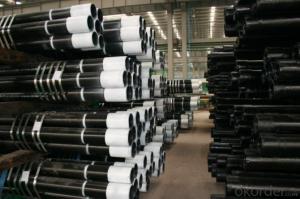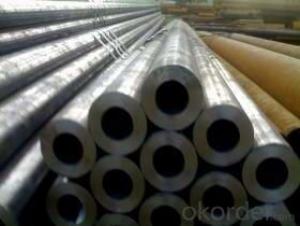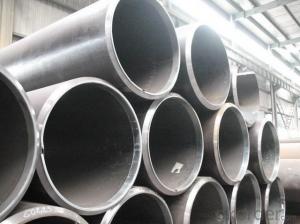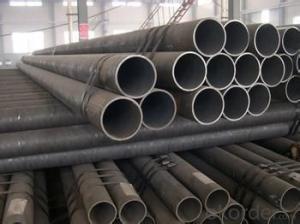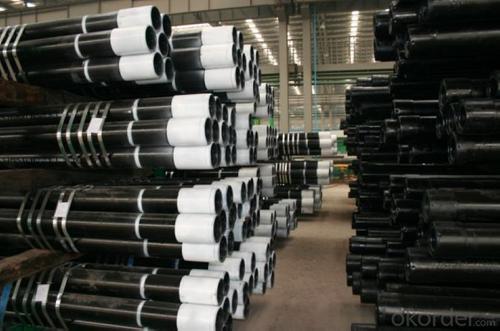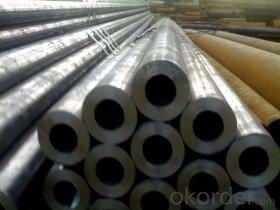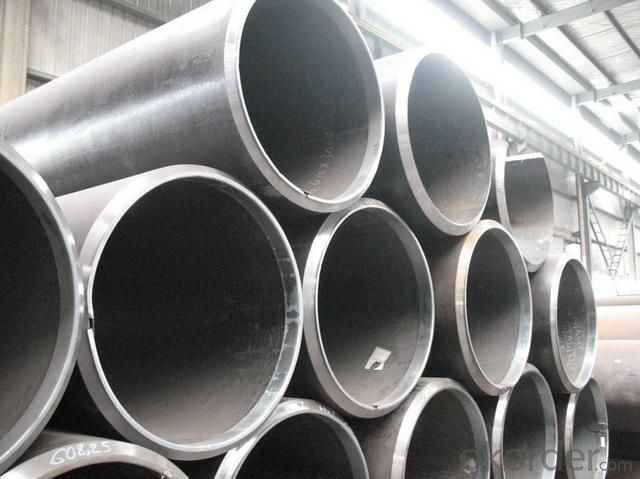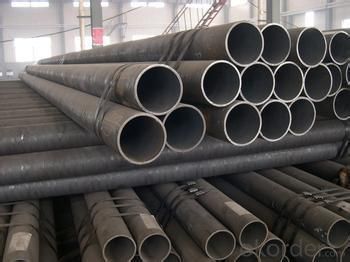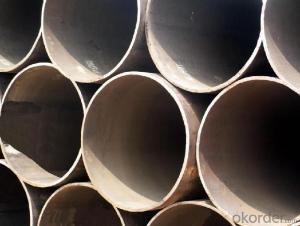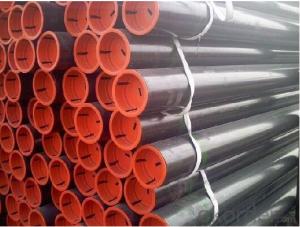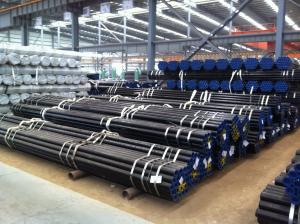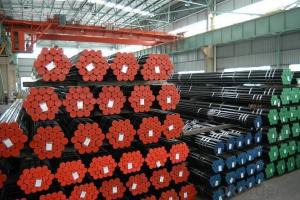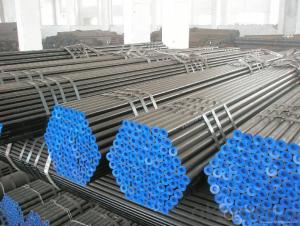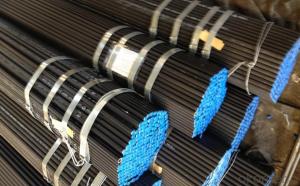API 5L Carbon Steel Seamless Pipes From Okorder API 5L
- Loading Port:
- Tianjin
- Payment Terms:
- TT OR LC
- Min Order Qty:
- 33 m.t.
- Supply Capability:
- 555 m.t./month
OKorder Service Pledge
OKorder Financial Service
You Might Also Like
Product Description:
1、Main Features of the Seamless Steel Pipe:
• High manufacturing accuracy
• High strength
• Small inertia resistance
• Strong heat dissipation ability
• Good visual effect
• Reasonable price
2、Seamless Steel Pipes Images:
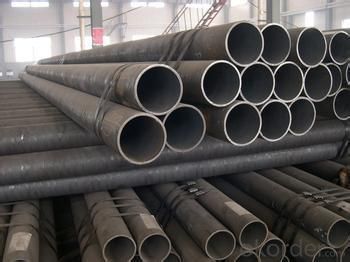
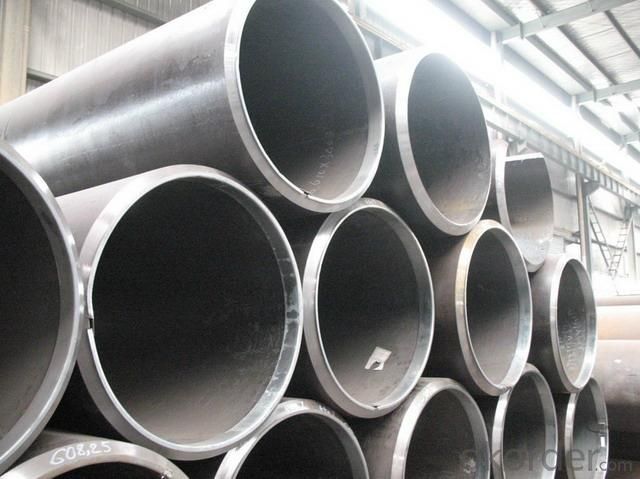
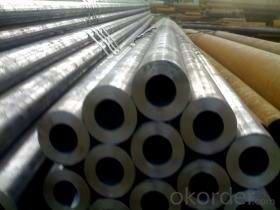
3、Packaging & Delivery
| Packaging Details: | beveled, plastic caps covered two ends, black painting, marking on each pipe, tied in bundles by steel strip for the convenience of long distance transportation. |
Delivery Detail: | Pipes in stock , immediately; If produce, around 15 days |
4、Seamless steel pipe Specification:
Standard:
GB, DIN, ASTM, API
GB/T8162, GB/T8163, GB/T 3087, GB/T5310, DIN 1626, DIN 17175, ASTM A106-2006, ASTM A53-2007, ASTM A210-1996, ASTM A333-2005, ASTM A179-1990, ANSI B36.10M-2004, ASME B36.10M-2004, API 5CT, API 5LGrade:
10#-45#, Cr-Mo alloy, A53-A369, API J55-API P110, ST35-ST52, Q195-Q345
10#, 20#, 45#, 30CrMo, A53(A,B), A106(B,C), A210, A178-C, API J55, API K55, API N80, St37, St42, St52.4, Q345Thickness:
0.8 - 60 mm
Section Shape:
Round
Outer Diameter:
5- 920 mm
Secondary Or Not:
Non-secondary
Application:
Oil Pipe
Technique:
Hot Rolled
Certification:
ISO, API
Surface Treatment:
COATING: OILED
Special Pipe:
API Pipe
Alloy Or Not:
Non-alloy
Carbon Steel Seamless Pipes API 5L GR.B/ ASTMA53/A106 GR.B
Size: | od245mm*wt10mm |
Brand Name: | XPY |
Outside diameter: | 5-920mm |
Wall thickness: | 0.8-60mm |
Length: | random or fixed |
Price Terms: | FOB, CNF, CIF |
Shipment: | in containers or in bulk |
Standard: | ASTMA53, A106 GR.B; ASTM178-C; ASTMA1045; ASTMA283-D; A210-C; API5L ; API5CT, St33, St52, St42, St45-8, DIN1629, DIN17175; BS, JIS and so on. |
CHINESE STANDARD | AMERICAN STANDARD | GERMAN STANDARD |
20# | ASTMA106-B | St45-8 DIN17175 |
ASTMA53-B | St42-2 DIN1626 | |
ASTM178-C | St45-4 DIN1629 | |
45# | ASTMA1045 | CK45 |
16Mn | A210-C | St52.4 DIN1629 |
St52 DIN1629 | ||
37Mn5 | J55 | |
Q235 | ASTMA283-D | St33 |
5、FAQ of Seemless Steel Pipes:
①How is the quality of your products?
Our products are manufactured strictly according to national and internaional standard, and we take a test
on every pipe before delivered out. If you want see our quality certifications and all kinds of testing report, please just ask us for it.
Guaranteed: If products’ quality don’t accord to discription as we give or the promise before you place order, we promise 100% refund.
②How about price?
Yes, we are factory and be able to give you lowest price below market one, and we have a policy that “ for saving time and absolutely honest business attitude, we quote as lowest as possible for any customer, and discount can be given according to quantity”,if you like bargain and factory price is not low enough as you think, just don’t waste your time.Please trust the quotation we would give you, it is professional one.
③Why should you chose us?
Chose happens because of quality, then price, We can give you both.Additionally, we can also offer professional products inquiry, products knowledge train(for agents), smooth goods delivery, exellent customer solution proposals.Our service formula: good quality+good price+good service=customer’s trust
SGS test is available, customer inspection before shipping is welcome, third party inspection is no problem.
Any question, pls feel free to contact us !
- Q: Can steel pipes be used for steam applications?
- Yes, steel pipes can be used for steam applications. Steel pipes have high strength and durability, making them suitable for carrying high-pressure steam. They can withstand the high temperatures and pressures associated with steam, making them a reliable choice for steam transportation in various industries.
- Q: What are the lengths of scaffold steel tubes?
- Scaffold tubes are our name for materials used to build scaffolding, because most scaffolding uses tubular bamboo or steel tubing. Bamboo and other bamboo is for a long time in the use of the scaffolding tube, but due to lack of safety and durability, now only in rural and urban area construction is lagging behind some of the home building small building has been used. The modernization construction, the most commonly used type of scaffolding pipe is steel pipe, the scaffolding should not only meet the demand of workers, but also to meet the characteristics of scaffolding firm and durable, so tough hard steel is the best choice. The selected steel pipe generally requires smooth surface, no cracks, no bending, no rust, and meet the relevant national standards.
- Q: What are the different manufacturing standards for steel pipes?
- There are several manufacturing standards for steel pipes that are widely recognized and implemented in the industry. These standards ensure that the steel pipes are produced to meet specific requirements and quality standards. Some of the most common manufacturing standards for steel pipes include: 1. American Society for Testing and Materials (ASTM): ASTM standards are widely used in the United States and cover a wide range of steel pipe specifications. These standards include specifications for seamless and welded steel pipes, as well as various grades and dimensions. 2. International Organization for Standardization (ISO): ISO standards are globally recognized and provide guidelines for the production of steel pipes. ISO standards cover areas such as dimensions, materials, testing, and quality control. 3. European Norm (EN): EN standards are applicable in Europe and provide specifications for various types of steel pipes. These standards cover aspects such as dimensions, materials, manufacturing processes, and testing. 4. Japanese Industrial Standards (JIS): JIS standards are widely used in Japan and have gained international recognition. These standards cover dimensions, materials, and testing methods for steel pipes. 5. British Standards (BS): BS standards are commonly used in the United Kingdom and cover a range of steel pipe specifications. These standards include requirements for dimensions, materials, and testing procedures. 6. American Petroleum Institute (API): API standards are specifically developed for the oil and gas industry and cover various aspects of steel pipe manufacturing. These standards include specifications for seamless and welded pipes used in oil and gas exploration, production, and transportation. It is important for manufacturers, buyers, and users of steel pipes to be aware of these standards to ensure the quality, compatibility, and reliability of the pipes. Compliance with these standards helps to ensure that the steel pipes meet the necessary requirements and are suitable for their intended applications.
- Q: How can two smooth steel pipes be joined? The size of the two pipe is different (except for welding)
- Rectangular fastener: used for the connection of two vertical intersecting steel tubes. It relies on the frictional force between the fastener and the steel tube to carry the load.Swivel fastener: used for connecting two steel tubes intersecting at any angle
- Q: How are steel pipes used in the aerospace manufacturing industry?
- Steel pipes are commonly used in the aerospace manufacturing industry for various purposes such as hydraulic systems, fuel lines, and structural components. They offer excellent strength, durability, and resistance to high temperatures, making them ideal for carrying fluids and supporting the overall structure of aircraft.
- Q: Can steel pipes be used for natural gas processing plants?
- Yes, steel pipes can be used for natural gas processing plants. Steel pipes are commonly used in the oil and gas industry due to their high strength, durability, and resistance to corrosion. They can safely transport natural gas and are capable of withstanding the high pressure and temperature conditions typically found in processing plants.
- Q: How do you protect steel pipes from rusting?
- There are several ways to prevent rusting in steel pipes. One common method involves applying a protective coating to the pipes. This can be done using paint or other coatings specifically designed for metal surfaces. The coating acts as a barrier between the steel and the elements, stopping moisture and oxygen from reaching the metal and causing rust. Another method is to galvanize the steel pipes. This involves coating them with a layer of zinc, which creates a protective barrier against rust. Galvanizing is often used for outdoor applications or in environments with high moisture levels. Regular maintenance is also important for preventing rust. It is necessary to inspect the pipes for corrosion or damage and address any issues immediately. Keeping the pipes clean and dry can also help prevent rust formation. In some cases, sacrificial anodes can provide additional protection. These anodes, made of zinc or magnesium, are attached to the steel pipes. They corrode instead of the steel, sacrificing themselves to protect the pipes from rust. Proper storage and handling of steel pipes are crucial as well. They should be stored in a dry, well-ventilated area, away from moisture and humidity. Care should be taken to avoid scratching or damaging the protective coatings when handling the pipes. By implementing these methods and practices, steel pipes can be effectively safeguarded against rust, ensuring their longevity and durability.
- Q: Do steel pipes require maintenance?
- Yes, steel pipes do require maintenance. While steel pipes are durable and long-lasting, they can still be subject to wear and tear over time. Regular maintenance is important to ensure their optimal performance and prolong their lifespan. One important aspect of maintenance is inspecting the pipes for any signs of damage or corrosion. Steel pipes can be vulnerable to rust and corrosion, especially in environments with high humidity or exposure to water. Regular inspections allow for early detection of any issues, which can prevent more significant damage and costly repairs in the future. Another aspect of maintenance is cleaning the pipes. Over time, steel pipes can accumulate debris, sediment, or mineral deposits. These build-ups can restrict the flow of fluids or affect the quality of the transported materials. Regular cleaning helps to remove these obstructions and maintain the efficiency of the pipes. Depending on the application, steel pipes may also require periodic lubrication or coating. This helps to reduce friction, prevent corrosion, and enhance the pipes' durability. Lubricants and coatings can be applied during maintenance to ensure the pipes continue to function smoothly and resist corrosion. Overall, regular maintenance of steel pipes is essential to maximize their performance, prevent damage, and prolong their lifespan. By investing time and effort in maintenance, potential issues can be identified and addressed early on, ultimately saving time and money in the long run.
- Q: What are the different methods of pipe joining using steel pipes?
- There are several methods of pipe joining using steel pipes, each with its own advantages and disadvantages. 1. Threaded and coupled: This method involves threading the ends of the steel pipes and using couplings to connect them. It is a simple and cost-effective method, but it is not suitable for high-pressure or gas applications. 2. Welding: Welding is a popular method for joining steel pipes. It involves heating the ends of the pipes and fusing them together using a welding process. This method creates a strong and leak-proof joint, but it requires skilled labor and can be time-consuming. 3. Grooved: In this method, the ends of the steel pipes are grooved and then connected using mechanical couplings or fittings. It is a quick and reliable method, suitable for both high-pressure and low-pressure applications. However, it requires specialized tools and equipment. 4. Flanged: Flanged joints involve connecting steel pipes using flanges, which are flat discs with bolt holes. The pipes are aligned and bolted together using gaskets to create a secure connection. This method is commonly used for large-diameter pipes and high-pressure applications, but it can be expensive and time-consuming to install. 5. Compression: Compression fittings are used to join steel pipes by compressing a ferrule or sleeve against the pipe. This method is quick, easy, and requires no special tools. However, it is not suitable for high-pressure or high-temperature applications. 6. Brazing: Brazing involves heating the ends of the steel pipes and melting a filler material between them to form a joint. It is a reliable method for joining pipes in HVAC and refrigeration systems, but it requires skilled labor and careful temperature control. It is important to consider the specific requirements of the application, such as pressure, temperature, and material compatibility, when selecting the appropriate method of pipe joining using steel pipes.
Send your message to us
API 5L Carbon Steel Seamless Pipes From Okorder API 5L
- Loading Port:
- Tianjin
- Payment Terms:
- TT OR LC
- Min Order Qty:
- 33 m.t.
- Supply Capability:
- 555 m.t./month
OKorder Service Pledge
OKorder Financial Service
Similar products
Hot products
Hot Searches
Related keywords
